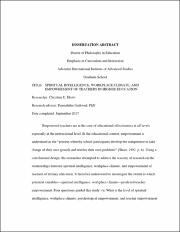Spiritual intelligence, workplace climate, and empowerment of teachers in higher education
Abstract
Empowered teachers are at the core of educational effectiveness at all levels
especially at the instructional level. In the educational context, empowerment is
understood as the “process whereby school participants develop the competence to take
charge of their own growth and resolve their own problems” (Short, 1992, p. 6). Using a
correlational design, the researcher attempted to address the scarcity of research on the
relationships between spiritual intelligence, workplace climate, and empowerment of
teachers of tertiary education. It therefore endeavored to investigate the extent to which
potential variables—spiritual intelligence, workplace climate—predicted teacher
empowerment. Four questions guided this study: (a) What is the level of spiritual
intelligence, workplace climate, psychological empowerment, and teacher empowerment
as perceived by Adventist teachers in Adventist Higher Education Institutions (AHEIs) in
Southeast Asia? (b) Is there a statistical difference between categories of demographic
variables and spiritual intelligence, workplace climate, psychological empowerment, and
teacher empowerment? (c) Are the four variables—spiritual intelligence, workplace
climate, psychological empowerment, and teacher empowerment—correlated? And (d)
what is the best predictive model for teacher empowerment considering the three
independent variables—spiritual intelligence, workplace climate, and psychological
empowerment?
The population of the study was Adventist teachers working in AHEIs in
Southeast Asia. Data collection was be done using various instruments: a self-constructed
Spiritual Intelligence measurement (2016); the School Participants Empowerment scale
by Short and Rinehart (1992); the Psychological Empowerment scale by Spreitzer
(1995); and the Higher Education Institution Organizational Climate survey by Natário,
Araujo, and Couto (2014). Except for the self-constructed Spiritual Intelligence
Measurement, written permission to use these instruments have already been secured
from their various authors. The data was analyzed using the Statistical Package for Social
Studies.
The respondents of this study showed a very high level of spiritual intelligence
(M = 4.41), psychological empowerment (M = 5.73), high in workplace climate (M =
5.65), and teacher empowerment (M = 3.97). There were varied levels of perception of
Adventist teachers working in AHEIs in Southeast Asia at the dimension levels of each
construct. First, teachers showed the highest level of perception in the motivation
dimension of the workplace climate construct followed by commitment, interpersonal
relationships, working conditions, satisfaction, training, functions, leadership, benefits,
and performance assessment respectively. Second, teachers showed the highest level of
perception in the meaning dimension of the psychological empowerment construct
followed by competence, self-determination, and impact respectively. Third, teachers
showed the highest level of perception in the self-efficacy dimension of the teacher
empowerment construct followed by status, impact, professional growth, autonomy, and
decision-making respectively.
Except for work conditions, the personal dimensions of workplace climate
(motivation, commitment, interpersonal relationships, and satisfaction) had a higher level
of perceptual precedence over the professional dimensions of workplace climate
(functions, leadership, benefits, and performance assessment) among Adventist teachers
in AHEIs in Southeast Asia. Except for age, there were no significant differences of
spiritual intelligence among respondents in relation to their gender, educational
qualification, and years of teaching experience. Except for years of teaching experience,
there was no significant statistical difference of teacher empowerment among
respondents in relation to their gender, age, and educational qualification. Also, the status
dimension showed a significant statistical difference with teacher empowerment. The
final predictive model of the study included impact, self-determination, competence,
commitment, and performance assessment as the best predictors of teacher
empowerment.


